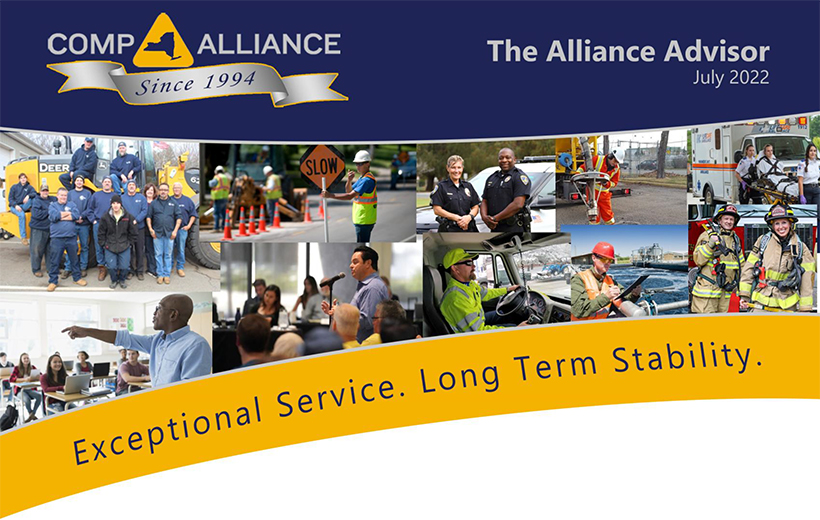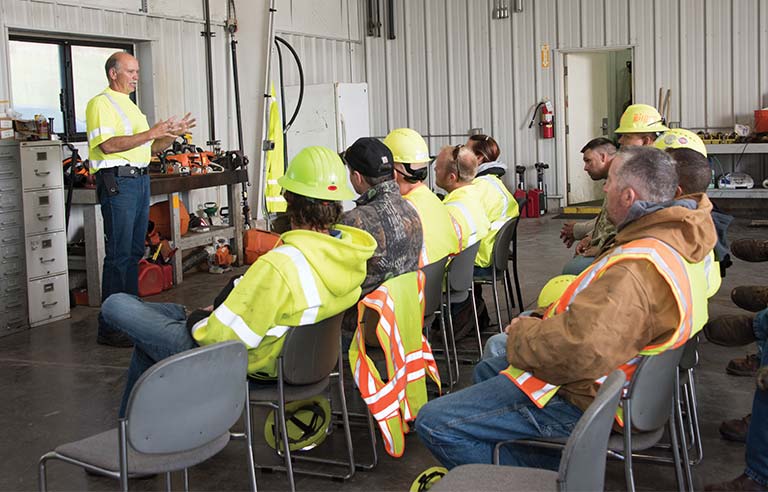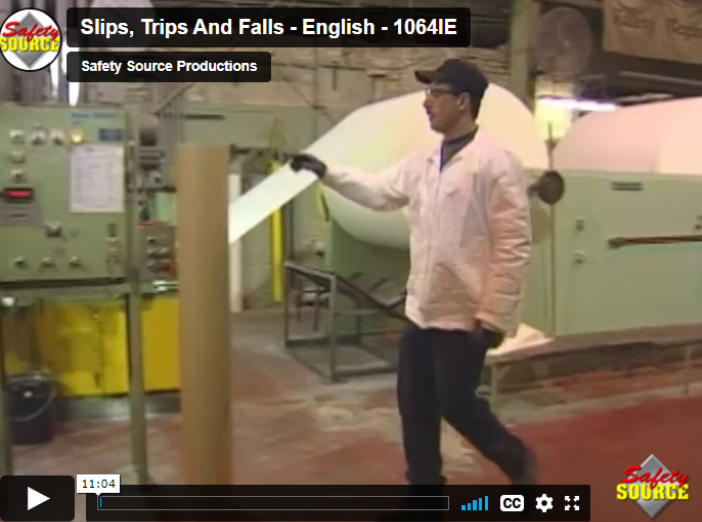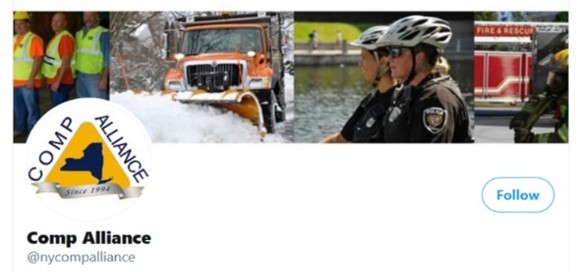
In This Issue
- The Comp Alliance Welcomes 8 New Members in June and July
- June and July Renewal Members to Receive Member Loyalty Award Checks
- Situational Awareness – The Foundation for Good Decision Making
- Legislative Update
- Introducing Bill Rabbitt, Our New Regional Marketing Representative
- Upcoming Virtual Training Seminars
- Featured Safety Source Topic – Slip, Trip, Fall Prevention
- Stay Informed
The Comp Alliance Welcomes 8 New Members in June and July
The Comp Alliance continued its steady growth for 2022 by adding eight new members to the program in June and July. We welcome the following new members to the program and look forward to working with all of you.
- Broome Tioga BOCES
- City of Long Beach VFD
- Oxford Academy CSD
- Town of Ellicottville
- Town of Elmira
- Town of Irondequoit
- Village of Hamburg
- Village of Springville
June and July Members to Receive Loyalty Award Checks
The Comp Alliance is pleased to announce an upcoming distribution of our Member Loyalty Award. In appreciation of those who have contributed to its continued success, the Comp Alliance will distribute a portion of its surplus to members. This special monetary award reflects recognition by the Board of Trustees of fiscal challenges faced by municipalities. The Member Loyalty Award provides a tangible benefit of municipal cooperation by returning funds to local governments and schools for the betterment of their communities.
All members who renewed with or joined the Comp Alliance in June and July will receive their Loyalty Award checks later this summer. Please keep an eye out for your checks in the mail during the 3rd quarter. Awarded amounts will be disbursed based on the individual member's longevity of membership with the Comp Alliance and its annual funding contribution.
The Comp Alliance is a not-for-profit workers' compensation group self-insurance program for municipalities and school districts. Focusing on improving workplace safety and providing stable funding for its members, the Alliance was formed in the early 1990s. New York Municipalities struggled to budget for unpredictable workers' compensation costs annually. The Comp Alliance offers its members budgetary stability and the opportunity to achieve significant savings by sharing the costs of workers' compensation insurance. Today, the Comp Alliance has over 330 members and more than $66 million in surpluses to help maintain long-term financial stability.
The Comp Alliance mission statement ensures members meet their long-term workers' compensation liabilities while maintaining stable funding contributions. With sponsorship by the Association of Towns of the State of New York and the New York State Conference of Mayors, the goals of the Comp Alliance remain the same.
Contact a Comp Alliance Marketing Manager or your insurance broker for more information on the Member Loyalty Award Program. Visit the Comp Alliance at www.compalliance.org for more details. Follow us on Twitter and Facebook for additional program enhancements and announcements.
Situational Awareness the Foundation for Good Decision Making
The week of June 19-25 was designated as National Safety Stand Down Week. This is a joint initiative of the International Association of Fire Chiefs (IAFC), the National Volunteer Fire Council (NVFC), the National Fire Protection Association (NFPA), and the Fire Department Safety Officers Association (FDSOA). The main objective was to promote safety training and awareness to fire departments. This year’s focus was on situational awareness as the foundation of good decision-making.
The practice of situational awareness can be applied to other aspects of municipal operations and was recently discussed during active shooter training for a municipal operation. The police instructor informed the audience to maintain situational awareness during workplace violence emergencies, as an approach to proper response. To address and maintain safety standards, this thought process can be utilized during town hall, highway, DPW, fire, police, and other operations too. This will also prove beneficial during emergency operations such as natural disasters, workplace violence, water/sewer breaks, fire response, and others.
To have situational awareness is to have a perception of the current environmental conditions, the comprehension of their meaning, and the projection of their future status. For municipal operations, it involves knowing what is going on around you at any given time and making proper safety decisions based on this knowledge. It is the foundation for sound decision-making.
With respect to workplace violence prevention, municipal staff can complete active shooter training and improve facility and employee safety through the establishment of safety procedures such as single points of entry, working in teams, installing office barriers, updating camera systems, and installing panic alarms. In addition to these controls, staff that maintains awareness around their workstations can better protect themselves and colleagues during hostile incidents. Understanding what might be happening and proper response (run, hide, fight) can save one’s life. In this way, the use of situational awareness can be helpful during workplace violence incidents.
Additional benefits of situational awareness include the completion of routine, but hazardous, work duties. It can help employees to identify deficiencies in the process and make corrections before injuries occur. Woodchippers and chainsaws can be the most dangerous equipment used by your municipal highway or DPW staff. Staff should be trained on the proper use of the equipment prior to use. This includes safety devices and appropriate Personal Protective Equipment (PPE) to be worn. Due to the hazards of operating this equipment, staff with situational awareness can prevent injuries. Precautions can be taken by avoiding too much brush from being placed in the chipper chute, improving footing while handling brush or felling trees, observing poor and changing weather conditions (rain, heat, cold), exchanging worn or missing PPE, replacing absent guards on equipment, or correct staff who might misuse equipment. These unsafe conditions can occur at any time during the operation and insightful employees can spot them and correct them before they lead to an injury.
Firefighters should practice situational awareness through training with experienced staff to focus on crucial aspects of given situations, knowing what distractions to avoid, listening to commands, and coordinating efforts.
Highway and DPW employees who observe operations, predict safe (or unsafe) outcomes, and maintain (or avoid/remove) them will be safer for their efforts. As an example, this summer might include a work zone setup. This will consist of planning the road site, what equipment is needed and available, understanding weather, soil and road conditions, expectations (good and bad) from the public, where to position employees, what PPE will be necessary, and how to react to traffic issues.
Conditions will vary throughout the duration of the work site. If your staff is able to comprehend these changes and respond safely to them it will help keep the area safe for workers and the community.
Situational awareness can also be helpful during other routine operations such as working with hazardous chemicals, driving, snowplow operations, outdoor work in the winter, parks and recreation work in summer, as well as office and administrative duties related to IT use. The ability to understand a changing work environment, predict what is likely to happen based on these conditions, and make decisions that keep yourself and co-workers safe can be applied to a variety of work responsibilities in municipal operations.
Situational awareness can be improved through experience and training. One key to safety is to make good, sound decisions based on the current circumstances. Not everyone makes good decisions all the time. With experience and training, it will be more likely that the correct decision will be made which keeps employees safe. Police officers who train on arrest techniques, CDL drivers who learn to drive defensively, water and sewer plant operators who know how to respond to a HAZWOPER incident, grounds crew who wear proper PPE while mowing and trimming, etc.
The variety of work completed for municipal operations present employees with continuously changing environments. These conditions provide opportunities for staff to observe and respond with varying degrees of success. Employees who are trained and gain experience in tackling these conditions exercise situational awareness resulting in error prevention, performance improvement, and injury reduction.
Legislative Update
Several bills amending workers’ compensation law recently passed both the New York State Assembly and the Senate. Three of these bills represent either an expansion of the compensability parameters under the New York workers’ compensation law or provide an increase in a benefit rate.
A.7178A / S.8271A increases the minimum compensation from $150 per week to one-fifth of the NYS Average Weekly Wage. This amounts to a minimum benefit of $318.91 per week through 2022, and jumps to $337.64 per week in 2023. While this would not affect most full-time employees of NYS municipalities and schools, it may have a sizable impact on the compensation rate for part time, seasonal, or summer workers. The bill also states that if the worker’s wage rate represents less than 1/5th of the statewide average weekly wage (to be reset at $1,688.19 per week as of 07/01/22), the employee would receive 100% of their wage rate while disabled.
Another bill, A.1118 / S.0768 defines “temporary, total disability” as “the injured employee's inability to perform his or her pre-injury employment duties or any modified employment offered by the employer that is consistent with the employee's disability” By defining “total, temporary disability” as it does, this bill poses a number of problems. First, there is concern among employers that the reference to “modified duty” could be interpreted to place a mandate on employers to offer modified duty to injured employees. While this is interpretation is not supported by the plain text of the law, it is stated to be the purpose of the law in the sponsor’s memo and justification, and will certainly be the interpretation advanced by claimants and their attorneys. A mandate of this nature may be impossible for many municipalities to comply with, as it risks violating collective bargaining agreements and civil service laws and rules that prohibit out-of-title work. In addition, by effectively nullifying “temporary, partial disability”, this bill has the potential to significantly increase costs to employers.
Lastly, A.2020A / S.6373 lowers the burden of proof for all employees to file claims for work-related stress. This bill extends to all workers the same benefit that was previously granted to first responders, firefighters, EMT workers, and police officers who encounter emergency situations that involve an extraordinary degree of stress. The bill eliminates the “work-related emergency” requirement that the mental health issue is caused by an unusual emergency would no longer be in effect, only that the causative event was extraordinary. Under this bill, the workers’ compensation board “may not disallow the claim upon a factual finding that the stress was not greater than that which usually occurs in the normal work environment.” Accordingly, the law creates a situation where a claim for “extraordinary stress” cannot be denied because it is ordinary stress common to work environment. It is expected that a vast number of these types of claims that were formerly disallowed by the Comp Board would now be allowed.
The overall impact of these bills would significantly increase the costs of workers’ compensation for all employers. If you are interested in learning more about these bills or how to communicate your position on them, we encourage you to reach out to your respective municipal association.
Introducing Bill Rabbitt, Our New Regional Marketing Representative
The Comp Alliance is excited to introduce a new Regional Marketing Representative, Bill Rabbitt. Bill comes to us having experience with a carrier and agencies in NY. He has previously managed sales and service for a workers’ compensation program. Bill is from the greater Albany area and looks forward to working with our members in the eastern portion of the state. Bill will be working with our existing agents and members, as well as prospective members of the Alliance. Bill will be reaching out soon and can be contacted at This email address is being protected from spambots. You need JavaScript enabled to view it. or 518-598-7198.
Upcoming Virtual Training Seminars
The Comp Alliance has several Live Virtual Video Conference Trainings scheduled for our members throughout the months of July and August.
August.
PESH-mandated topics of Workplace Violence, Right-To-Know – Chemical Safety, and Blood-Borne Pathogens will be covered.
Upcoming Schedule
7/18 - 10:00 a.m. - Noon
7/20 - 5:00 p.m. – 7:00 p.m.
7/25 - 10:00 a.m. - Noon
7/27 - 1:00 p.m. – 3:00 p.m.
8/1 - 10:00 a.m. - Noon
8/4 - 10:00 a.m. - Noon
8/8 – 10:00 a.m. - Noon
8/10 - 1:00 p.m. – 3:00 p.m.
8/15 – 10:00 a.m. – Noon
8/17 – 10:00 a.m. – Noon
8/22 – 10:00 a.m. – Noon
8/25 – 1:00 p.m. – 3:00 p.m.
8/29 – 10:00 a.m. - Noon
The Comp Alliance also has scheduled several virtual training programs covering the mandatory PESH-required topic of HAZWOPER. This awareness level seminar is required for municipal employees who may be the first upon a hazardous waste emergency on-site or off-site. Recommended for highway, department of public works, and water and sewer sanitation departments.
Upcoming HAZWOPER Schedule
7/21 - 8:00 a.m. - 8:30 a.m.
7/29 – 8:00 a.m. – 8:30 a.m.
8/12 – 8:00 a.m. – 8:30 a.m.
8/16 – 8:00 a.m. – 8:30 a.m.
8/29 – 8:00 a.m. – 8:30 a.m.
Email Robert Blaisdell at This email address is being protected from spambots. You need JavaScript enabled to view it. to register for any of these training sessions. Attendance is limited.
Please continue to check your email and the Comp Alliance website www.compalliance.org for additional dates later in the year.
Featured Safety Source Topic – Slip, Trip, Fall Prevention
The Comp Alliance’s continued partnership with Safety Source, a leader in quality online safety training video content, has enabled many of our members to supplement and/or incorporate Safety Source videos into their safety training program. Safety Source is constantly adding to their video library and updating several topics that municipalities and school districts can utilize to train and educate their staff.
Slips, Trips, and Falls are one of the leading loss causes for our municipal and school members. Approximately 20% of national workers’ compensation claim costs are attributed to Slip, Trip, and Falls. Safety Source Video SS4164lE addresses the risk presented by slips, trips, and falls and steps you can take to reduce these preventable injuries from occurring.
The Safety Source Library is available by clicking here. If you are not yet registered for access to this diverse video library, please contact This email address is being protected from spambots. You need JavaScript enabled to view it.
The Comp Alliance strives to keep members informed of the latest industry and program news. Please visit us at www.compalliance.org for the latest news, updated events calendar, safety articles, safety bulletins and more.




